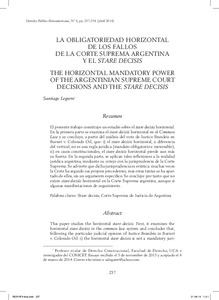Please use this identifier to cite or link to this item:
https://repositorio.uca.edu.ar/handle/123456789/10438| Título: | La obligatoriedad horizontal de los fallos de la Corte Suprema Argentina y el stare decisis The horizontal mandatory power of the Argentinian Supreme Court decisions and the stare decisis |
Autor: | Legarre, Santiago | Palabras clave: | CORTE SUPREMA DE JUSTICIA; STARE DECISIS; COMMON LAW; JURISPRUDENCIA; OBLIGATORIEDAD DEL PRECEDENTE | Fecha de publicación: | 2014 | Editorial: | Universidad del Desarrollo. Facultad de Derecho. Centro de Justicia Constitucional | Cita: | Legarre, S. La obligatoriedad horizontal de los fallos de la Corte Suprema Argentina y el stare decisis [en línea]. Derecho Público Iberoamericano.2014, 4. Disponible en: https://repositorio.uca.edu.ar/handle/123456789/10438 | Resumen: | Resumen:
El presente trabajo constituye un estudio sobre el stare decisis horizontal. En la primera parte se examina el stare decisis horizontal en el Common Law y se concluye, a partir del análisis del voto de Justice Brandeis en Burnet v. Colorado Oil, que: i) el stare decisis horizontal, a diferencia del vertical, no es una regla jurídica (mandato obligatorio e inexorable); ii) en casos constitucionales, el stare decisis horizontal pierde aun más su fuerza. En la segunda parte, se aplican tales reflexiones a la realidad jurídica argentina, mediante su cotejo con la jurisprudencia de la Corte Suprema. Se advierte que dicha jurisprudencia es errática: muchas veces la Corte ha seguido sus propios precedentes, mas otras tantas se ha apartado de ellos, sin un argumento específico. Se concluye por tanto que no existe stare decisis horizontal en la Corte Suprema argentina, aunque sí algunas manifestaciones de seguimiento. Abstract: This paper studies the horizontal stare decisis. First, it examines the horizontal stare decisis in the common law system and concludes that, following the particular judicial opinion of Justice Brandeis in Burnet v. Colorado Oil: i) the horizontal stare decisis is not a mandatory juridical rule; ii) in constitutional cases the horizontal stare decisis is even less stronger. In the second part, the paper compares those conclusions with the Argentinian Supreme Court case law. The author argues that the Argentinian case law is erratic: sometimes the Court has followed its own prior precedents, but in other cases the Court has not followed them, without giving a specific argument. He concludes that there is no horizontal stare decisis in the Argentinian Supreme Court, although is possible to find some exceptions. |
URI: | https://repositorio.uca.edu.ar/handle/123456789/10438 | ISSN: | 0719-2959 0719-5354 (online) |
Disciplina: | DERECHO | Derechos: | Acceso abierto | Fuente: | Derecho Público Iberoamericano No.4., 2014 |
| Appears in Collections: | Artículos |
Files in This Item:
| File | Description | Size | Format | |
|---|---|---|---|---|
| obligatoriedad-horizontal-fallos-corte.pdf | 214,84 kB | Adobe PDF |  View/Open |
Page view(s)
185
checked on Apr 30, 2024
Download(s)
112
checked on Apr 30, 2024
Google ScholarTM
Check
This item is licensed under a Creative Commons License

